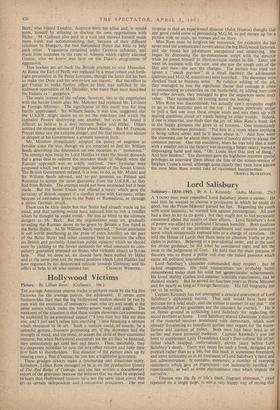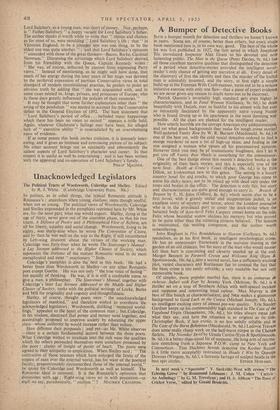Lord Salisbury
Salisbury-1830-1903. By A. L. Kennedy. (John Murray. 25s.) A YOUNG man once consulted Lord Salisbury about a career. He said that he wanted to choose a pfofession in which he could do good, but the Prime Minister pursed his lips. Regarding the youth with some intensity, he warned him against presumption. All men had a duty to try to do good ; but they ought not to feel personally concerned about the results of their efforts. Lord Salisbury's love of power was allied to a profound Christian humility. Both qualities lay at the root of the patrician detachment and massive common sense which occasionally exposed him to a charge of cynicism. I-le told the House. of Lords that there were no absolute truths or prin- ciples-in politics. Believing in a providential order, and in the need for divine guidance, he did what he considered right and left the issue to the judgement of God. He held that the main purpose of theories was to throw a polite veil over the naked passions which cause all political convulsions.
Lord Salisbury's character commanded deep respect ; but he lacked magnetism. His mild eccentricities are probably better remembered today than his solid but unspectacular achievements. He loved shabby clothes and amateur scientific experiments, and he disliked society. But he served for fourteen years as Prime Minister and for nearly as long as Foreign Secretary.. His full biography has yet to be written. Captain Kennedy has not attempted a detailed assessment of Lord Salisbury's diplomatic record. That task would have been too intricate for a brief study, and the author is content to say that " the incalculables of his greatness are the disasters he averted." He is on firmer ground in criticising Lord Salisbury for neglecting the social problem at home. Lord Salisbury shared Gladstone's distrust, of the material motives associated with democracy, which were already threatening to transform parties into organs for the manu- facture and auction of policy. Both men had been bred in an earlier and more personal tradition. Captain Kennedy 's aim has been to supplement Lady Gwendolen Cecil's four-volume life of her father which stopped, .unfortunately, eleven years before Lord Salisbury's- death. There was room for such a book, designed as a portrait rather than as a life, but this book is sometimes breathless, and most noticeably so in its treatment of Lord Salisbury's third and last administration. It contains, moreover, a number of sweeping statements which give an impression—not necessarily justified-9r superficiality, as well as some platitudinous ones which impede the narrative.
Finance was the fly in life's fresh, fragrant ointment," twice repeated on, a single page, is not a very happy way of saying that Lord Salisbury, as a young man, was short of money. Nor, perhaps, is`! Father Salisbury " a happy variant for Lord Salisbury's father. The author thinks it worth while to write that " choice and chance, as for most of us, were moulding " Lord Salisbury's life ; that " in Victorian England, to be a younger son was one thing, to be the
eldest son was quite another " ; and that Lord Salisbury's opinions " coincided with those of the great thinkers—Bacon, Burke, Cardinal Newman." Discussing the advantage which Lord Salisbury derived, from his friendship with the Queen, Captain Kennedy writes : " She was, of course, debarred by custom from expressing Party views." Instead of mentioning, as he might well have done, that much of her energy during the later years of her reign was devoted to the perfervid expression of partisan Conservative views in total disregard of modern constitutional practice, he prefers to point an obvious truth by adding that " she was acquainted with, and in some cases related to, kings, princes, and princesses of Europe, who in those days greatly influenced the policies of their countries." ' It may be thought that some further explanation other than " the swing of the pendulum " was needed to account for the Conservative defeat in the General Election of 1892. The bare statement that " Lord Salisbury's period of office ... included many happenings which there has been no room to record " appears a trifle bald. Again, whatever Gladstone's failings may • have been, his alleged lack of " executive ability " is contradicted by an overwhelming mass of evidence.
If at some points this book invites criticism, it is intensely inter- esting, and it gives an intimate and convincing picture of its subject. No other account brings out so succinctly and conveniently the salient aspects of Lord Salisbury's character and career. In that respect it is useful as well is entertaining ; and it has been written with the approval and co-operation of Lord Salisbury's family.
PHILIP MAGNUS.



































 Previous page
Previous page